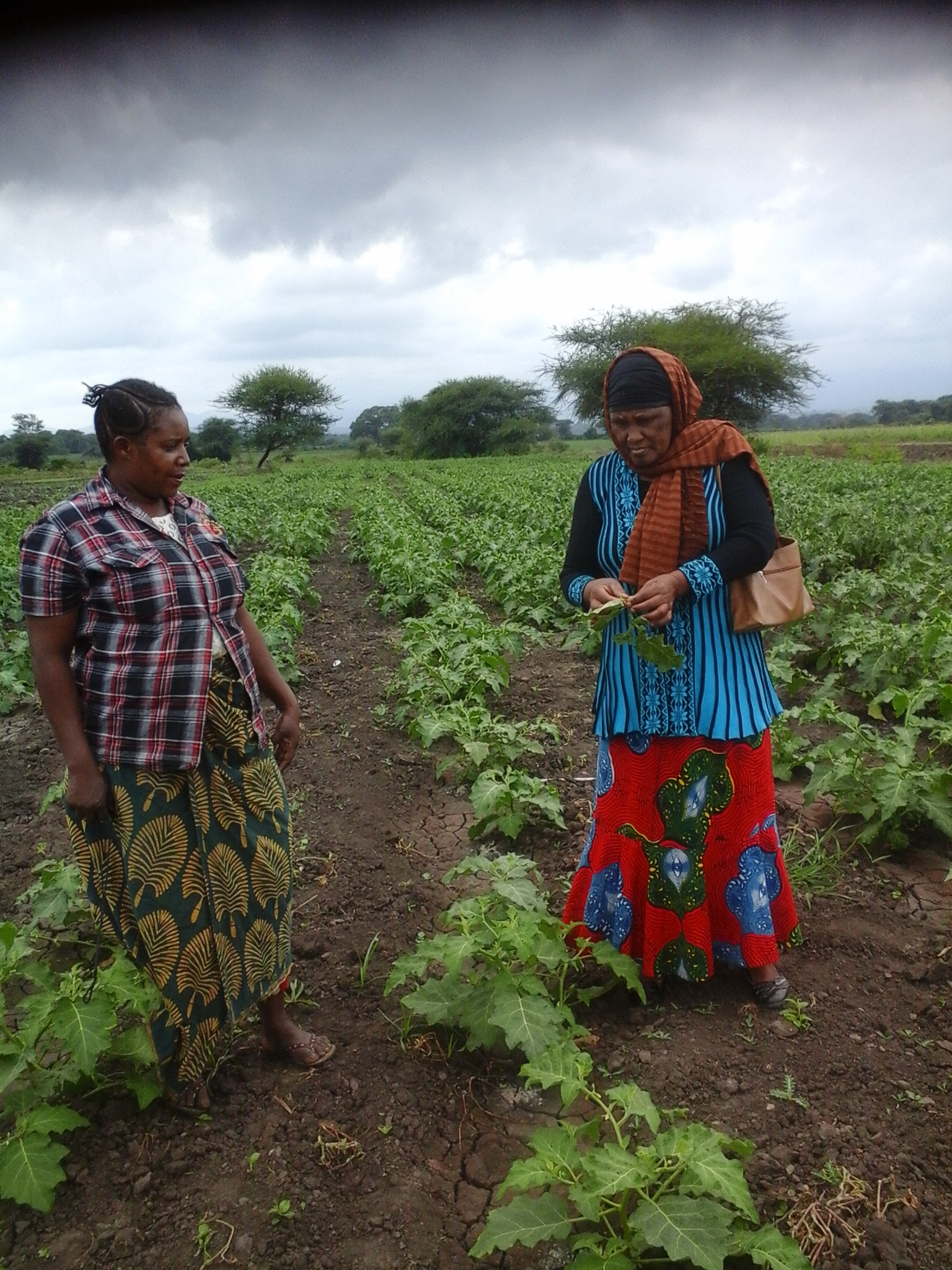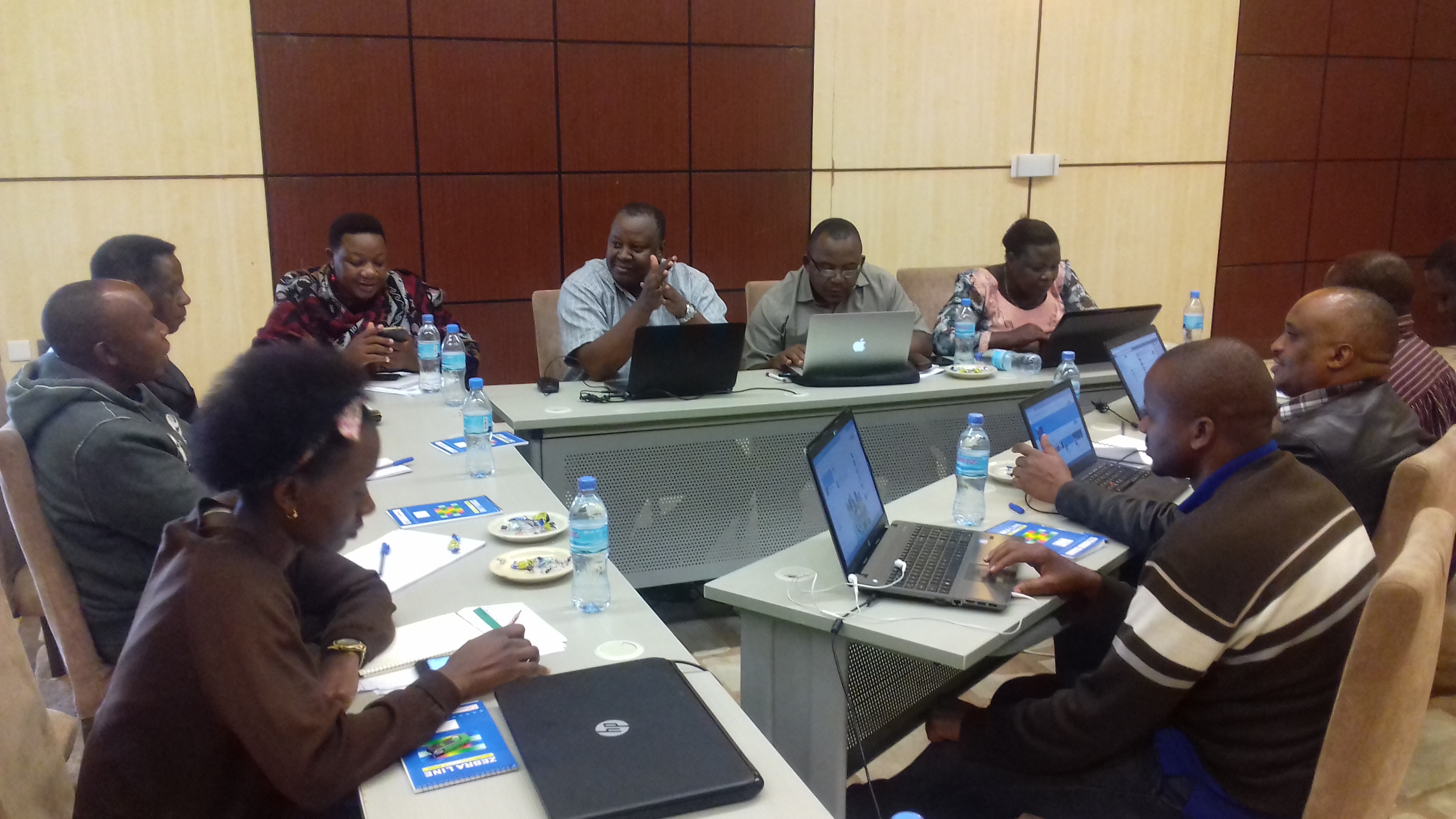 Photo: Agricultural extension worker of Arumeru district interacting with a seed grower contracted by Alpha seed company in Arusha. Photo credit: Kansiime, CABI
Photo: Agricultural extension worker of Arumeru district interacting with a seed grower contracted by Alpha seed company in Arusha. Photo credit: Kansiime, CABI
CABI’s Good Seed Initiative (GSI) aims to improve the seed systems of small-scale farmers in sub-Saharan Africa and South Asia. A GSI project funded by Irish Aid has been implemented in Tanzania and Uganda (2013-2016) to increase production and consumption of African Indigenous Vegetables (AIVs) and also strengthen AIV seed system to deliver quality seed.
AIVs cover a wide range of leafy green vegetables, fruits and pseudograins, which are native to or have become naturalised in Africa. AIVs are more nutrient-rich than many exotic alternatives; for example, leafy green AIVs such as amaranth or African nightshade have higher levels of essential nutrients, such as iron, protein, vitamin A and vitamin C, than cabbages. There is increasing demand for AIVs in Tanzania and other east Africa countries, especially in urban centres, as consumers become more aware of the nutritional benefits associated with these foods. However, sustainable access to quality seed is key to achieving increase production to meet the increase in demand.
In Tanzania, GSI activities led by CABI, working with The World Vegetable Centre (AVRDC), Horticulture Research and Training Institute (HORTI) Tengeru and INADES Formation, aimed to address the gap in access to quality seed by supporting a farmer-led quality declared seed system (QDS) in Dodoma region and a contract-certified seed system in Arusha region. GSI worked with value chain partners to train farmers in agronomy, irrigation and pest management; strengthen producer groups and organise events to promote the nutritional value of AIVs and importance of using quality seed.
Through multi-stakeholder Innovation Platforms (IP), GSI facilitated processes to find creative and mutually acceptable methods for stakeholder to address problems in the value chain and exploit opportunities in AIV subsector and national seed system, including policy actors involved in regulatory aspects of seed systems. GSI engaged the Tanzania Official Seed Certification Institute (TOSCI) to pilot QDS seed sales outside the ward, the previous limit for sales according to seed policy. Farmers were linked to seed traders / merchants beyond the ward boundaries, providing a market for farmer seed and addressing seed demand.
 Photo - Seed policy review meeting small working group in April 2017 in Arusha. Ministry of Agriculture and Livestock was represented and presented the amended seed guidelines. Photo credit: Kansiime, CABI
Photo - Seed policy review meeting small working group in April 2017 in Arusha. Ministry of Agriculture and Livestock was represented and presented the amended seed guidelines. Photo credit: Kansiime, CABI
Advocacy processes require strong evidence and GSI has been contributing to that body of evidence. GSI generated case studies to better understand challenges in promoting seed entrepreneurship in Dodoma and Arusha, contributing to this body of evidence. Results showed that the seed producers were able to deliver high quality seed at affordable prices to small-scale farmers, although there were sustainability issues as the costs of inspections are not recovered from farmers[i]. The case studies contributed to Integrated Seed Sector Development Africa initiative (funded by the Dutch government) that has been pulling together evidence from all over Africa that can be used in high level policy advocacy activities. Project partners also participated in seed policy review and dialogue meetings where they shared GSI experiences and recommendations based on evidence generated.
Recommendations from the GSI work in Tanzania included;
- A change in policy guidelines to allow AIV QDS seed producers to sell their seed beyond the geographical boundaries of a ward. Seed marketing guidelines require QDS to be sold within the ward in which it is produced. A ward is the lowest government administrative structure at the community level, and usually represents between 1,000 and 21,000 people.
- A review of the policy and regulations governing varietal registration of AIVs and also to review the guidelines used for field inspection of AIV seed crops of non-registered varieties grown under both the QDS and certified seed systems.
- The need to establish alternative mechanisms for seed inspection and testing to ensure effective and timely services
Seed policy review took place in 2016 and reviewed seed regulation signed in January 2017 by the Minister of Agriculture and Livestock in Tanzania. The new guidelines among other adjustments have considered some of the proposals advanced by GSI and others in various multi-stakeholder engagements. Notable are;
- Vegetable crop varieties will be registered based on Distinctness, Uniformity and Stability (DUS) results only. This is an adjustment from the previous process that also included conducting national performance trials in at least 3 locations for 3 seasons. This adjustment anticipates a much faster process to register new varieties that can be integrated into farmer seed production – QDS or certified.
- TOSCI has developed a network of certified seed inspectors up to district level, who are mandated to inspect QDS. This will reduce inspection costs significantly for seed producers, while ensuring more timely inspections. In addition, TOSCI has reduced mandatory costs – registration, inspection – by up to 50% in some cases.
Blog written by Monica Kansiime, CABI
[i]http://www.issdseed.org/sites/default/files/case/twg_1_synthesis_paper_effective_mechanisms_seed_quality_control20160912.pdf.
